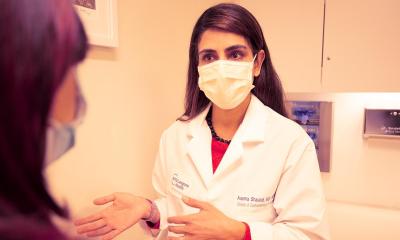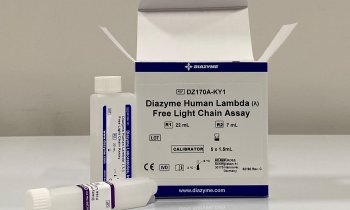Image source: Shutterstock/Anatomy Image
News • Colorectal cancer study
Covid-19 pandemic slashes CRC diagnoses by over 40%
The number of colorectal cancer (CRC) cases diagnosed fell dramatically by 40% in a year during the Covid-19 pandemic, new research has shown.
The research, which was presented at United European Gastroenterology (UEG) Week Virtual 2021 and was conducted across multiple hospitals in Spain, compared data from the first year of the Covid-19 pandemic with data from the previous year. Of 1,385 cases of CRC diagnosed over the two-year period, almost two thirds (868 cases, 62.7%) were diagnosed in the pre-pandemic year from 24,860 colonoscopies. By contrast, only 517 cases (37.3%) were diagnosed during the pandemic, which also saw a 27% drop in the number of colonoscopies performed, to 17,337.
Those who were diagnosed with CRC between 15 March 2020 and 28 February 2021 were also older than in the pre-pandemic year, had more frequent symptoms, a greater number of complications and presented at a more advanced disease stage.
Cases of colorectal cancer undoubtedly went undiagnosed during the pandemic. Not only were there fewer diagnoses, but those diagnosed tended to be at a later stage and suffering from more serious symptoms
María José Domper Arnal
Experts say the fall is a consequence of the suspension of screening programmes and the postponement of non-urgent colonoscopy investigations during the pandemic. Fewer cancers were identified by CRC screening in the pandemic period, with just 22 (4.3%) cases found in comparison to 182 (21%) in the pre-pandemic year. During the pandemic, more patients were diagnosed through symptoms (81.2% of diagnoses) compared with the pre-pandemic year (69%).
Dr María José Domper Arnal, from the Service of Digestive Diseases, University Clinic Hospital and the Aragón Health Research Institute (IIS Aragón) in Zaragoza, Spain, and lead author of the study, commented “These are very worrying findings indeed – cases of colorectal cancer undoubtedly went undiagnosed during the pandemic. Not only were there fewer diagnoses, but those diagnosed tended to be at a later stage and suffering from more serious symptoms.”
There was a significant increase in the number of patients being diagnosed with serious complications – a sign of late-stage disease – with an increase in symptoms such as bowel perforation, abscesses, bowel obstruction and bleeding requiring hospital admission. These cases made up 10.6% pre-pandemic and 14.7% during the pandemic. The number of stage IV cancers being diagnosed rose during the pandemic year, with stage IV cases making up 19.9% of cases, in comparison to 15.9% in the previous year. “Although these figures are across a population of 1.3 million in Spain, it’s highly likely that the same drop in diagnoses would have happened elsewhere across the globe where screening was stopped and surgeries postponed, especially in countries that were heavily impacted by Covid-19”, explained Dr María José Domper Arnal. “Colorectal cancer is often curable if it’s caught at an early stage. Our concern is that we’re losing the opportunity to diagnose patients at this early stage, and this will have a knock-on effect on patient outcomes and survival. We are likely to see this fall out for years to come.”
CRC (or bowel cancer) is Europe’s second largest cancer killer and the most common digestive cancer. Annually, there are 375,000 newly diagnosed cases in the EU, and it claims the lives of over 170,000 people. Since the rollout of screening programmes, which now cover over 110 million EU citizens, Europe has observed a steady decline in CRC mortality rates. A recent global study published in The Lancet Gastroenterology and Hepatology demonstrated a correlation between the introduction of screening programmes and a reduction in CRC mortality rates, supporting the benefits of effective screening interventions.
Source: United European Gastroenterology
04.10.2021









